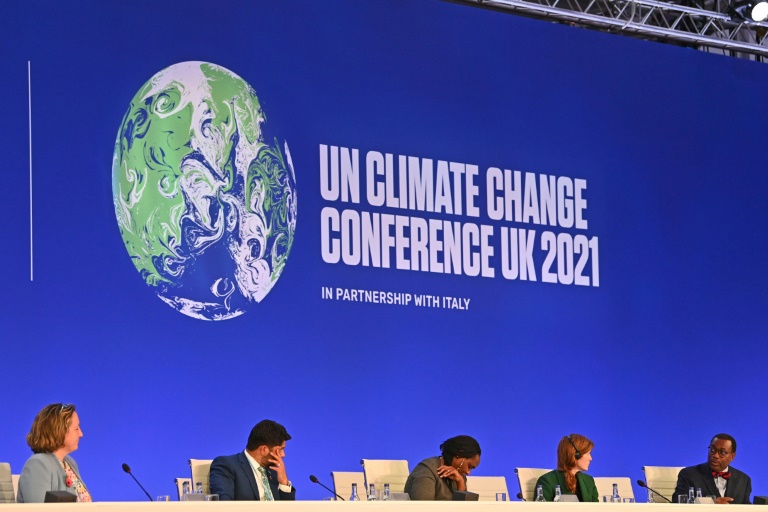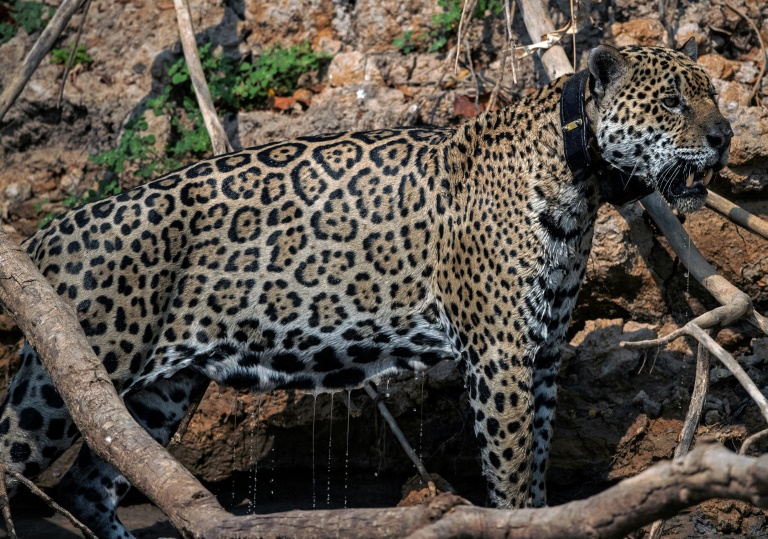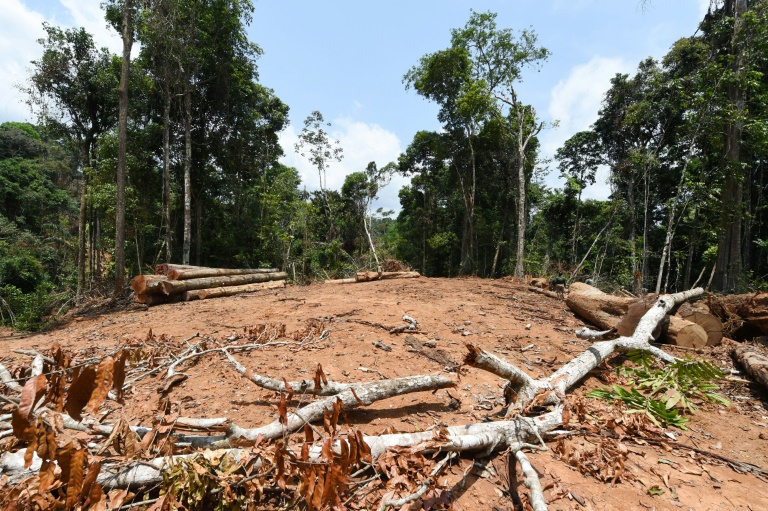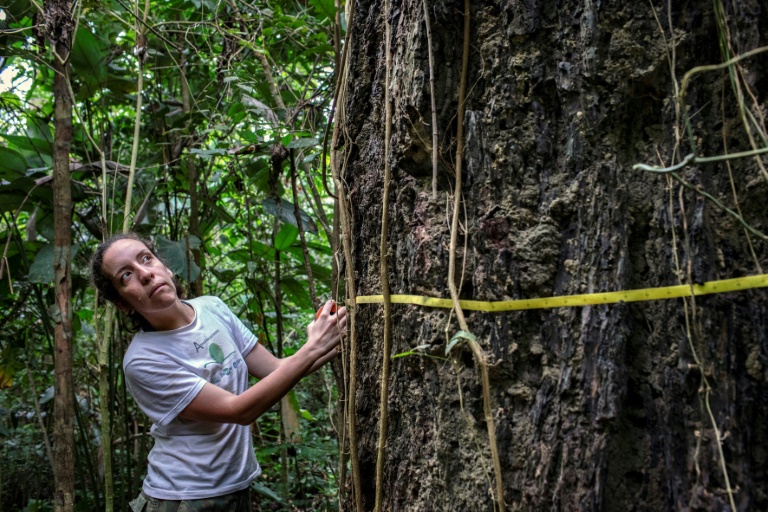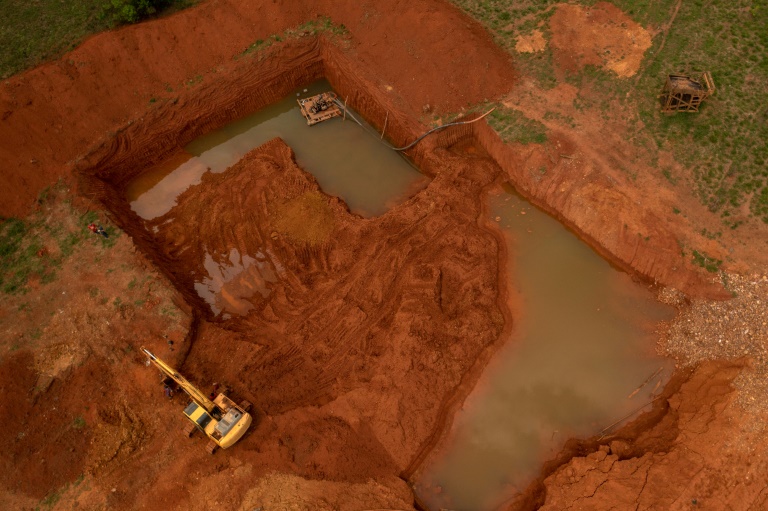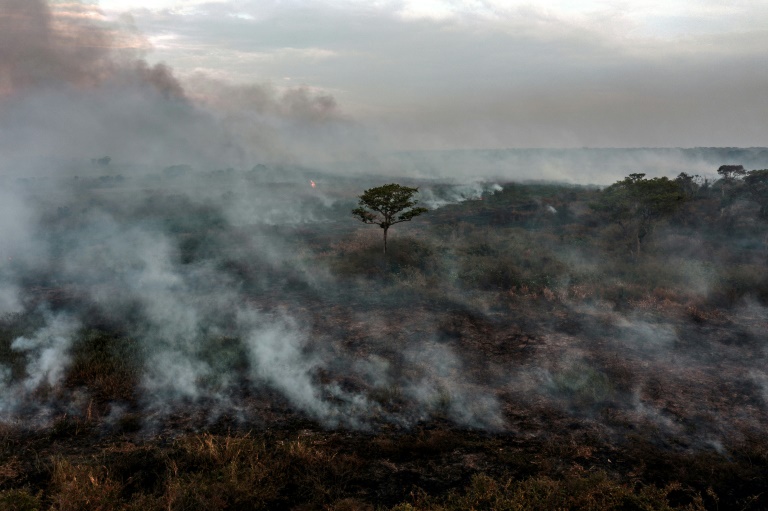Something is wrong.
Holed up in her lab, Brazilian atmospheric chemist Luciana Gatti crunches her numbers again and again, thinking there is a mistake.
But the same bleak conclusion keeps popping up on her screen: the Amazon, the world’s biggest rainforest — the “lungs of the Earth,” the “green ocean,” the thing humanity is counting on to inhale our pollution and save us from the mess we’ve made of the planet — is now emitting more carbon than it absorbs.
Splashed across South America in an exuberant blob of deep green, the Amazon basin is one of the world’s great wildernesses, a place where life teems in the heat of the tropics, fed by the myriad rivers criss-crossing the jungle like blue blood vessels.
Home to more than three million species, the rainforest bursts with lush vegetation, which absorbs huge amounts of carbon through photosynthesis — a key fact as humankind struggles to stop heating the planet with greenhouse gases.
As carbon dioxide emissions have surged by 50 percent in 60 years, to nearly 40 billion tonnes worldwide, the Amazon has absorbed a large amount of that pollution — nearly two billion tonnes a year, until recently.
But humans have also spent the past half-century tearing down and burning whole swathes of the Amazon to make way for cattle ranches and farmland.
Gatti, who works at Brazil’s national space agency, has been tracking how much carbon the region emits and absorbs, watching for signs of a looming nightmare: that the destruction could push the Amazon to a “tipping point” where much of the rainforest dries up and turns to savannah.
Climate scientists say passing that point would be catastrophic: instead of helping curb climate change, the Amazon would suddenly accelerate it. Plummeting rainfall would cause its trees to die off en masse, releasing up to a decade’s worth of worldwide carbon emissions back into the atmosphere — and dooming our efforts to hold global warming somewhere near a livable limit.
When not in her lab outside Sao Paulo, Gatti can be found training bush pilots to collect her samples, by diving in a downward spiral from 14,500 feet, sucking up little flasks of air.
The bespectacled 61-year-old, who needs motion-sickness pills before each flight, has watched those flasks tell a steadily worsening story over the past decade.
In July, she and her team published their grimmest findings yet, in the journal Nature.
First: the Amazon is now a net carbon source, mainly because of humans setting it on fire. Second: even subtracting emissions caused by fires, the southeastern Amazon is now a net carbon emitter.
That part of the Amazon — the heart of cattle country in Brazil, the world’s biggest producer and exporter of beef and soy — no longer needs our help to spew carbon into the air. It has started doing so all by itself.
“We’re killing the Amazon. And that’s not something our climate models have taken into account. As bad as the predictions are, they’re actually optimistic,” says Gatti.
“The Amazon has become a carbon source way sooner than anyone thought. That means we’re going to reach the horror-show scenario way sooner, too.”
Gatti’s is one of several recent studies to sound a blaring alarm on the Amazon.
It is based on data from 2010 to 2018.
Since then, the destruction has accelerated — especially in Brazil, home to 60 percent of the Amazon, where far-right President Jair Bolsonaro took office in 2019 with strong backing from the farm lobby, pushing to open protected lands and indigenous reservations to agribusiness and mining.
Under Bolsonaro, deforestation in the Brazilian Amazon has surged from an average of 6,500 square kilometers (2,500 square miles) per year during the previous decade to around 10,000 — an area nearly the size of Lebanon.
Scientists say it is impossible to be sure just how close the rainforest now is to the tipping point. But Gatti’s findings suggest we are teetering on the brink — if not tumbling over it already, at least in part of the Amazon.
How have we come this close to killing one of Earth’s most vital resources — one our own survival may depend on?
It is, in some ways, a story of evil: of bad guys exploiting a lawless frontier, festering corruption and their fellow human beings to rip riches from the land.
But it is also the story of all humanity: our troubled relationship with nature, our endless appetites, our seeming inability to stop.
This is a series of snapshots of how we got here, and where we go next.
– Welcome to the jungle –
Today, driving through the southeastern Amazon, there is little sign left of the rainforest.
It is a land of cowboy hats, boots with spurs and outsize belt buckles, of dusty towns packed with agricultural supply shops and Evangelical churches, of billboards advertising cattle auctions and rodeos, or welcoming visitors with the declaration: “Our town backs Bolsonaro.”
Vast plains of pasture and soybeans stretch to the horizon, dotted by grazing cattle and the occasional patch of forest or solitary tree.
It is almost hard to imagine it was once covered in jungle. But when Jordan Timo Carvalho moved here, in 1994, clearing the rainforest was still a massive, dirty job for would-be ranchers.
Timo, who grew up in Minas Gerais, in southeastern Brazil, had just graduated with a degree in agricultural engineering when his father bought some land for him to ranch from a World War II veteran-turned-Amazonian pioneer in Sao Felix do Xingu county, in the state of Para.
Then 24, Timo instantly took to the Wild West spirit in this frontier outpost of fortune-seekers, riffraffs and poor migrants looking to turn around their luck.
Brazil’s military dictatorship (1964-1985) had launched the large-scale “colonization” of the Amazon in 1970.
In a country then modernizing so fast its economic growth was dubbed the “Brazilian Miracle,” the regime saw the Amazon as backwards, and created a “National Integration Plan” to build roads across the rainforest.
It mounted a publicity campaign to attract pioneers, promising “Land without men for men without land” — never mind the indigenous peoples who had lived in the Amazon for millennia.
But the state had little presence on the ground, leading to a chaotic free-for-all that still reigned by the time Timo arrived — and lingers to this day.
Timo, a charismatic swashbuckler with a brown hat that looks part cowboy, part fedora, remembers slaughtering cows to trade them for gold with hungry wildcat miners, stashing the proceeds in a film canister in his shirt pocket and sleeping with his rifle in his hands, a pistol tucked into his waistband.
He cleared the 3,000 hectares (7,500 acres) for his father’s ranch using the same method everyone in the region did, he says: slashing and burning the rainforest, often with forced labor.
“It was all done with what they now call ‘modern slavery.’ That was the only way to do it back then,” he says.
The 51-year-old tells of a time he and his neighbor decided they needed 200 workers to clear new land. So they did the rounds of the local brothels, picking up down-and-out drunks and paying their tabs.
They locked them in a shed with a supply of food and alcohol, posting four gunmen outside.
When they had enough men, they loaded them on a ferry — with help from the police — and shipped them six hours down the Xingu River, a tributary of the Amazon, to the place they were deforesting.
“Those were crazy times,” Timo says.
He is unabashed telling these stories, which he paints as the reckless adventures of youth — his and the region’s. But he has had a change of heart about the destructive, violent process of turning the rainforest to pastureland.
Now a proud dad of one, he founded a consulting firm in 2009 to help slaughterhouses ensure they source cattle from ranches that do not deforest.
These days, he fights the environmental destruction he once took part in.
“The Amazon’s big issue is lawlessness,” he says.
“When you can’t apply the law, the bad guys win.”
It remains a pressing problem.
– Cattle capital –
According to one widely cited study, the Amazon will reach the tipping point when 20 to 25 percent of it is deforested.
We are currently at 15 percent — up from six percent in 1985.
Most of that destroyed rainforest — an estimated 80 to 90 percent — is now pasture for cattle.
Sao Felix has led the way. The sprawling county, which had 200,000 cows in 1994, has become Brazil’s beef capital, with over two million head of cattle — more than 15 for every inhabitant.
It also leads Brazil in emissions, releasing the equivalent of nearly 30 million tonnes of carbon dioxide in 2018, more than Sao Paulo.
In fact, seven of the 10 counties with the highest emissions in Brazil are in the Amazon, the result of burning down the rainforest and replacing it with methane-emitting cattle.
The destruction isn’t as senseless as it might seem: many ranchers say raising cattle in the Amazon is one of the easiest ways to make money there is.
The process is simple. First, cut the old-growth trees from a plot of land and sell them for timber. Then, burn what’s left.
Next, plant grass, put up fencing, bring in some cattle and let them graze. A truckload of fattened bulls brings in around 110,000 reais ($20,000).
The soil wears out quickly with this method. But it is easy enough to clear new pasture every few years, especially for those who have no qualms about occupying public land.
Environmentalists say the destruction has grown more brazen under Bolsonaro, a 66-year-old former army officer who jokingly calls himself “Captain Chainsaw.”
A surge in fires in the Amazon in 2019, his first year in office, caused a global outcry and drew backlash from investors.
Under pressure, Bolsonaro, who comes up for reelection next year, has since banned fires during the dry season and deployed the army to the Amazon.
But there has been no drop in deforestation.
Enforcing environmental regulations on the ground is notoriously difficult in Brazil.
In Sao Felix, that thankless job falls to the county’s environment secretary, Sergio Benedetti, who has a team of 11 field officers to police an area more than twice the size of Switzerland.
Benedetti, 50, originally hails from Sao Paulo. An affable corporate type, he moved here a decade ago to work for Brazilian mining giant Vale, running environmental protection programs.
He remembers his surprise on arriving in the Amazon region, which he thought of as the jungle.
“It was just pasture, pasture, cows, pasture. I thought, ‘Where’s the forest?'” he says with a laugh.
Benedetti made the jump to government work in January, and is still brimming with the energy of a newcomer.
But he is aware of the daunting task he faces.
“Deforestation, fires, illegal mines — it’s part of the culture here. A big part of my job is changing that,” says the tall, clean-cut father of three.
He points to a group of motorcyclists riding through downtown Sao Felix without helmets.
“This is a lawless land,” he says.
A day later, Benedetti is sitting in the back of a 4×4 truck, crossing the Xingu River by ferry — there is no bridge here — then bouncing down a rutted dirt road.
He and his officers are trying to serve a summons on a landowner accused of illegal deforestation. But there is no sign of the man. The neighbors say they’ve never heard of him.
It is a common situation in Brazil. The Rural Environmental Registry, an online database launched in 2012 in an effort to hold landowners accountable for environmental crimes, is full of overlapping property claims, fake owners, fraudulent titles and attempts to seize public land.
Days later, Benedetti is in the car, leaving a voice message with an update on the case.
It turns out the landowner does exist — but claims he sold the land.
Benedetti’s office informed the man he would still face a fine of about $45,000. He will probably appeal, Benedetti says. It is a process that can drag on indefinitely. Studies report only around five percent of environmental fines get paid in Brazil.
Suddenly, Benedetti’s message cuts off.
“Sorry, I had a car coming at me here, driving up the wrong side of the road,” he resumes with a laugh.
“Good old Sao Felix do Xingu!”
– The cricket trick –
Razing the Amazon is a booming business for land-grabbers, who have perfected a hustle known as “grilagem” — loosely translated, “the cricket trick.”
“When someone has a fake document for a piece of land, he puts it in a drawer with some crickets,” or “grilos” in Portuguese, explains federal prosecutor Daniel Azeredo, one of the most prominent investigators fighting illegal deforestation in Brazil.
The crickets nibble at it, poop on it, “and after a while it starts to look old — like a real land title. That’s exactly what happens in the Amazon when people take public land.”
Environmentalists say the current industrial-scale destruction of virgin rainforest is driven by well-financed land-grabbers seeking massive profits.
The region is so vast and hard to police they often get away with it. The government has muddied things by repeatedly granting amnesties for illegal land claims — which Bolsonaro now wants to expand.
Sitting on the little veranda of his pale blue farmhouse, a wood-slat building with dirt floors, Jose Juliao do Nascimento tells the story of his fight to save his ranch from alleged land-grabbers.
Nascimento, who grew up in deep poverty, the oldest of 11 children, arrived in the Amazon from the central state of Goias, chasing the dream of a green El Dorado with abundant land.
He and his wife, Dilva, bought their 290 hectares for $10,000 in 2002, joining a group of 200 families who founded a little village in rural Sao Felix called Vila Novo Horizonte.
Although Nascimento had a notarized deed of sale, when he and his neighbors tried to register their land in the Rural Environmental Registry in 2012, they found the property was already registered to a company called AgroSB, he says.
AgroSB belongs to a group founded by powerful banker Daniel Dantas, nicknamed the “bad boy of Brazilian finance” for a history of corruption scandals and jail time.
Today, it operates a 145,000-hectare ranch in Sao Felix, part of which sits smack on the site of Vila Novo Horizonte.
Though Nascimento and his neighbors openly admit to deforesting to clear their farmland — a habit they are trying to break — they say their sins against the environment are nothing compared to the large-scale devastation wrought by AgroSB.
Residents accuse the firm of using heavy machinery around the clock to clear land on a massive scale. Federal prosecutors are currently pursuing 26 environmental cases against the company.
Nascimento says as AgroSB sought to assert its claim to their land, a group of shady characters started pressuring locals to leave.
“They had documents supposedly proving the land belonged to AgroSB. They offered to pay people a paltry sum to move out,” says Nascimento, 60, a father of five with an easy smile that belies his fighting spirit.
Local farmers say those overtures were often followed by a threat: “Either sell us the land, or we’ll buy it from your widow.”
They point a finger at two intermediaries identified by federal prosecutors in a 2003 report as “the organized crime bosses of Sao Felix do Xingu,” according to newspaper Folha de Sao Paulo: Joao Cleber de Sousa Torres and his brother Francisco.
The accusations in the report — including that the brothers orchestrated massive land-grabs in the area — did not dent the Torres’ clout.
Today, Joao Cleber is mayor of Sao Felix. Francisco, widely known as “Torrinho,” is president of the county’s powerful farmers’ federation.
The mayor did not agree to speak with AFP for this story.
Francisco de Sousa Torres denied involvement in organized crime. He told AFP he facilitated negotiations for properties that eventually became AgroSB’s ranch, but that “there was no pressure on anyone.”
AgroSB told AFP the allegations against it are “baseless” and that it practices sustainable farming and ranching.
It says Nascimento and others on the disputed land are in fact the ones who have invaded and deforested its property.
Undaunted by facing one of the most powerful firms in Brazilian agribusiness, Nascimento and his neighbors have pooled their meager savings, hired two lawyers and taken AgroSB to court.
– Holding onto hope –
Of course blame for the Amazon’s degraded state goes beyond Bolsonaro, and Brazil.
Gatti, the atmospheric chemist, argues the whole world bears responsibility.
Illegal Amazon timber is exported to the United States and Europe. Massive quantities of beef produced on razed rainforest are shipped around the world. Soy grown in the Amazon helps feed cows, chickens and pigs across the globe.
Governments should ban those imports, Gatti says.
“If you want to protect the Amazon, stop consuming the products that fuel its destruction.”
So how much time do we have left to save the Amazon — if any?
Experts fear a vicious cycle of deforestation, fires and climate change will only accelerate its decline.
The effects are already being felt across Brazil.
Amazon deforestation is having an impact on rainfall across a huge swathe of South America by shrinking the forest’s “flying rivers,” the vast amounts of precipitation generated by its 390 billion trees.
That contributed to the worst drought in nearly a century this year in Brazil’s southeast and central-west, wreaking havoc on crops and the hydroelectric dams the country depends on for two-thirds of its electricity.
The fallout already looks like the dystopian future climate scientists have warned of: Brazil has been hit recently by deadly sandstorms, devastating wildfires, soaring food prices and an electricity crisis.
Still, many experts say they are hopeful. There is no shortage of solutions — but we need to dive headfirst into all of them, they say.
A non-exhaustive list: achieve zero illegal deforestation; enforce current environmental regulations, then expand them; plant trees in deforested areas; increase the productivity of existing farms; prioritize forest-friendly agriculture, including crops such as cacao, acai berries and Brazil nuts.
Several recent studies have found one of the best solutions is expanding reservations for indigenous peoples, whose traditional cultures are often rooted in close communion with the natural world and deep respect for the environment.
Brazil has some 700 indigenous reservations — protected, semi-autonomous lands for native peoples. They cover around 13 percent of the country, including nearly a quarter of the Brazilian Amazon.
Many of Brazil’s 900,000 indigenous people are still fighting to reclaim the land they were forced from when settlers flooded the Amazon, a process that decimated native communities through a combination of genocide, torture, enslavement and disease.
Alessandra Munduruku is one of thousands of indigenous protesters who descended on Brasilia in August to fight a push by the Bolsonaro administration and its allies to block new indigenous reservations in cases where the native inhabitants were not present on the land in 1988 — including those who were displaced by force.
The protesters set up a sprawling camp near the seat of government, their traditional feather headdresses and bright costumes contrasting with the sleek white lines of Brazil’s ultra-modernist capital.
Munduruku, 37, a slight but fiery leader of the Munduruku people in Para, was decked out in a grass skirt and intricate black face paint, attacking Bolsonaro’s vision of the Amazon.
“Bolsonaro says we need development, not indigenous land. Tell me something: what development? Development that poisons our rivers and kills our forests? That leaves our people poor and hungry?” she says.
But she says she, too, is holding onto hope.
“There’s still a lot of forest left. There’s still time.”


